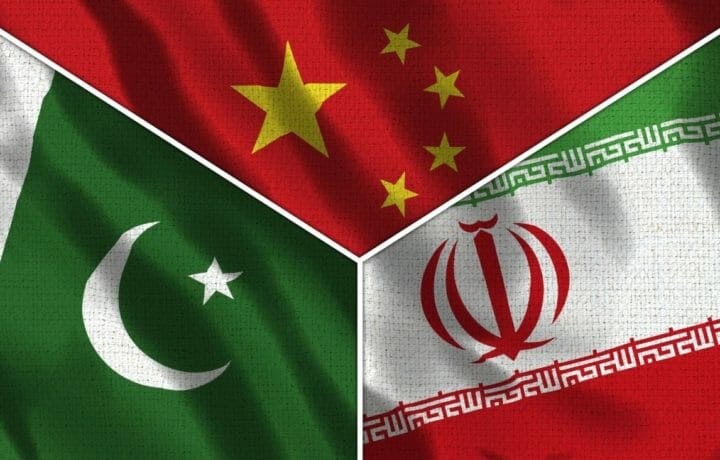The China-Iran-Pakistan Alliance likely spells trouble for human rights, and for countering future terrorism and aggression towards neighbors. These seemingly unlikely allies are steadily solidifying their partnerships and making recent headlines with their pacts.
Pakistan Quietly Anti-USA
“Long Live the Pure Land” is how the Iranian Foreign Minister gushed in his tweet about Pakistan’s 65th birthday as a nation. As Zarif put it “On this day 65 years ago, Pakistan became the world’s 1st Islamic republic…We’re proud to count Pakistan among our close fraternal neighbors, and we look forward to jointly working to expand ties between our Govts and nations.” This is a clear signal for the US-partnered nation of Afghanistan that lives between these two neighbors. While the Iranian regime is openly anti-USA, the Pakistan regime is seen, by most, as quietly anti-USA.
Iran and China
Iran and China, Iran’s largest trading partner, entered a 25-year pact on Saturday where the Chinese Foreign Minister Wang Yi stated “Our relations with Iran will not be affected by the current situation, but will be permanent and strategic.” This is a continuation of efforts begun in 2016 when China told Iran they would increase their bilateral trade to $600 billion in this decade. According to the Iranian Foreign Ministry the Pact “is a complete roadmap with strategic political and economic clauses covering trade, economic and transportation cooperation … with a special focus on the private sectors of the two sides.” The exchange of billions of investment cash for an uninterrupted oil supply is a logical move for China.
China–Pakistan Economic Corridor (CPEC)
China and Pakistan are bonded over the China–Pakistan Economic Corridor (CPEC) which is around $60 billion worth of infrastructure projects across Pakistan aimed at strengthening the ability to move goods across Pakistan to and from China. Some projects have created more Chinese jobs than Pakistani, but this is a much-needed economic jolt to a struggling Pakistani economy. It has tightened their relationship much, with Chinese leader Xi Jinping stating in April 2015 that “this will be my first trip to Pakistan, but I feel as if I am going to visit the home of my own brother.”
Different in some ways
How they can come together when they seem so different? China is a Marxist state that eschews religion, while Pakistan and Iran have built their governance and their raison d’être on the religion of Islam. Iran is a Shi’a Islam nation that works to spread their sect’s views and to counter Sunni ideas around the globe. Pakistan is a Muslim nation that supports Sunni violent Salafi and Wahhabi Islamist groups that operate in South Asia, most notably the Taliban. To top it all off, China is committing genocide against their Muslim Uyghur community right now, under the full view of both Iran and Pakistan, who claim to be defenders of Muslims around the globe.
The ties that bind
First, a dislike for Western Democracy ideals of individual freedom, blind justice, and equality for all humans brings the trio together. In the United States, these three nations find a perfect enemy to provoke. Each of them can build their own nationalism and patriotism by countering the evils of democracy and freedom. This is a topic that the governments think resonates with their people, so pointing out the ills of Western society “due to excessive freedom and equality” is a daily occurrence for government actors and their press. Beyond that, Pakistan is drawn to China because of its rapidly deteriorating economy. China has found a simple way to buy Pakistan’s loyalty and silence. Iran would like China to buy more Iranian oil, so Iran can escape the Western sanctions against them. Again, China has found a way to buy Iran’s loyalty and silence.
Looking at the future
As long as the regimes in Iran and Pakistan (heavily influenced by security forces and religious leaders) continue to survive, you can expect that China will manipulate those nations. China’s regime shows no signs of weakening, in fact they are increasing in nearly every measure of power.
Pakistan could be pulled from China’s orbit, but most nations are not willing to do the work required to salvage this young nation that is home to two growing mega-cities.
Iran is more deeply imbedded in their anti-Western ideology, and most nations are happy to attempt to keep Iran contained, instead of trying to undo the human-rights-abusing and militant culture that has destroyed the Iran that some once knew.
Ian Bremmer notes the China-Iran connection could backfire on China, stating China is usually in the balancing business, and that in a divided Middle East, this looks like China is choosing sides. Maybe they are.
For the U.S. and its allies, this signals a dangerous future. When three nations with naval ambitions, key natural resources, dubious human rights records, growing educated populations, and a unifying anti-Western ideology grow into a hardened alliance—finding a way to cleave one from another is nearly impossible. Will anyone take action? Will an alliance of human-rights respecting nations that are willing to counter these three be formed? It is likely the world is going to need a few leaders of the caliber of Churchill and Marshall shortly; or the triumvirate will put the world on its heels very easily.




